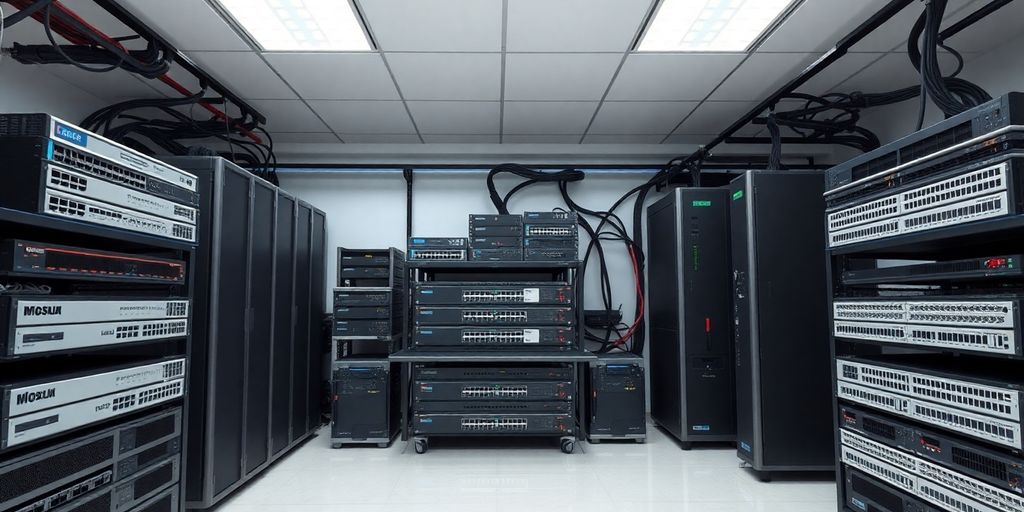Telecom services are more than just making phone calls or sending texts. They’ve become a backbone for our digital lives, connecting us to everything from social media to smart home devices. As technology evolves, telecom is not just keeping up but pushing the boundaries. From the rollout of 5G to the possibilities of 6G, telecom services are reshaping how we work, play, and stay connected. This article dives into the exciting changes and challenges in the telecom world, exploring how these services are set to transform our future.
Key Takeaways
- Telecom services are crucial for digital connectivity, impacting daily life and work.
- The shift from 4G to 5G and beyond is revolutionizing how we access information.
- AI and telecom together are enhancing customer experiences and network efficiency.
- Cybersecurity in telecom is vital for protecting users in a connected world.
- Sustainability in telecom is becoming a priority, focusing on reducing carbon footprints.
The Evolution of Telecom Services in the Digital Age

From Landlines to Smartphones: A Historical Perspective
It’s kind of wild to think about how far we’ve come. Back in the day, landlines were the only way to connect. You’d be tethered to a wall, waiting for that ring. Fast forward a bit and we got mobile phones, which was a game-changer. But they were big, clunky, and just for calls. Then, boom, smartphones hit the scene. Now, they’re mini computers in our pockets. In the late 1990s, civilian cellular mobile communications took off globally, marking a huge shift in how we stay connected. This shift wasn’t just about making calls anymore; it was about texting, browsing, and eventually, streaming. It’s been a crazy ride from landlines to smartphones.
The Role of Telecom in Modern Society
Telecom is everywhere now. It’s not just about talking to friends or family. It’s how we work, learn, and even shop. Think about remote work—without telecom, that wouldn’t be a thing. And schools? They’ve gone digital too. It’s like telecom is the backbone of modern life. We rely on it for everything from sending emails to watching Netflix. It’s woven into the fabric of our daily routines. Without it, we’d be pretty lost.
How Telecom Services Drive Economic Growth
Telecom isn’t just changing how we live; it’s boosting economies too. It’s like the engine of the digital economy. With more people getting connected, there’s a ton of new business opportunities. Startups can reach global markets easily, and established companies can streamline operations. Plus, telecom infrastructure creates jobs—lots of them. It’s a big deal for emerging markets, giving them a leg up in the digital age. Telecom is not just about calls and texts; it’s a powerhouse for economic growth.
Innovations in Telecom Services Transforming Connectivity
The Rise of 5G and Its Impact on Connectivity
5G is more than just a speed upgrade from 4G; it’s a leap into a new era of connectivity. This technology promises ultra-fast data speeds and incredibly low latency, which means your video calls and online games will be smoother than ever. Imagine downloading a full HD movie in seconds or having a video chat with zero lag. That’s the power of 5G. It’s not just for consumers, though. Industries like healthcare and automotive are set to benefit hugely. Remote surgeries and autonomous vehicles are just the tip of the iceberg. But to make this happen, telecom companies need to expand their network infrastructure and ensure widespread coverage.
Exploring the Potential of 6G Technology
While we’re still getting used to 5G, the telecom world is already buzzing about 6G. It’s expected to roll out in the next decade, and it’s going to take connectivity to the next level. Think of 6G as the internet of senses, where virtual reality feels real, and you can interact with digital objects as if they were physical. But it’s not just about fun and games. 6G could revolutionize sectors like agriculture, with real-time data helping farmers optimize crop yields. To achieve this, telecom operators will need to work on massive infrastructure upgrades and invest in new technologies.
Network Slicing: Customizing Connectivity for Diverse Needs
Network slicing is like having multiple virtual networks within a single physical network. Each slice can be tailored to specific needs. For instance, one slice can be optimized for high-speed video streaming, while another is perfect for IoT devices that need low power but reliable connections. This flexibility is crucial as we move towards a more connected world with billions of devices online. Telecom companies are using emerging technologies in telecom engineering to make network slicing a reality, ensuring that each device gets the connectivity it needs without compromising on performance.
As we step into the future, telecom innovations are not just changing how we connect; they’re transforming our lives in ways we never imagined. From smart cities to personalized healthcare, the possibilities are endless. The telecom industry’s challenge is to keep up with the rapid pace of change and ensure that these innovations are accessible to everyone.
Telecom Services and the Future of Work
Remote Work Revolution: Telecom’s Role
The shift to remote work has been massive, thanks in large part to telecom services. They make working from home possible by ensuring we stay connected. Without them, the remote work boom just wouldn’t have happened. It’s not just about emails and video calls; it’s about having a reliable and fast connection that lets employees access everything they need, anytime. As more people work from home, telecom companies are stepping up, offering better services to handle the increased demand.
Enhancing Productivity Through Advanced Connectivity
With better connectivity, productivity gets a boost. Employees can collaborate in real-time, share large files without a hitch, and use cloud services smoothly. This seamless connectivity is crucial for maintaining efficiency and ensuring that teams can work together, no matter where they are. Telecom services are constantly innovating to provide faster and more reliable connections, which directly impacts how productive remote teams can be.
Telecom’s Contribution to Digital Nomadism
Telecom services are also fueling the digital nomad trend. With the ability to work from anywhere, more people are choosing to travel while they work. This lifestyle is only possible because telecom companies provide the necessary infrastructure to stay connected globally. As telecom technology advances, we can expect even more people to embrace this way of working, knowing they can count on a stable and fast internet connection wherever they go.
Cybersecurity in Telecom Services: Protecting Digital Lives
The Importance of Cybersecurity in Telecom
In today’s digital world, keeping our data safe is more important than ever. Telecom companies are at the heart of this effort, managing vast networks that carry sensitive information. Without strong cybersecurity measures, these networks are vulnerable to attacks that can compromise personal and business data.
- Data Breaches: Unauthorized access to confidential data can lead to financial loss and damaged reputations.
- Service Disruptions: Cyberattacks can disrupt services, affecting millions of users.
- Privacy Concerns: Protecting user privacy is crucial for maintaining trust.
Telecom companies must perform annual security assessments to ensure their networks are secure. These assessments help identify vulnerabilities and implement necessary patches to protect against potential threats.
Building Trust with Secure Telecom Networks
Trust is a big deal in the telecom industry. People need to know their data is safe when using telecom services. By investing in cybersecurity, telecom providers can build trust with their customers. This involves:
- Implementing robust encryption methods to protect data.
- Regularly updating security protocols to combat new threats.
- Educating customers on safe internet practices.
A secure telecom network not only protects data but also enhances customer confidence, leading to increased loyalty and satisfaction.
Future Trends in Telecom Cybersecurity
The future of telecom cybersecurity is all about staying ahead of the threats. With new technologies like AI and quantum computing on the horizon, the landscape is changing fast.
- AI-Driven Security: AI can help detect and respond to threats more quickly than humans.
- Quantum Encryption: This emerging technology offers new ways to secure data against future threats.
- Automated Defense Systems: Automation in cybersecurity can lead to faster, more efficient threat detection and response.
As technology evolves, so do the threats. Telecom companies need to be proactive in adopting new security measures to protect their networks and their customers.
The Intersection of AI and Telecom Services
AI-Driven Network Optimization
AI is changing the way telecom networks operate. By analyzing real-time data, AI can manage network resources more efficiently. This means less downtime and better service for users. Telecom companies are using AI to predict and solve network issues before they affect customers. This proactive approach helps keep things running smoothly.
- Real-time Traffic Management: AI can adjust network settings based on current demand, ensuring smooth service.
- Predictive Issue Resolution: By identifying patterns, AI can fix problems before they happen.
- Improved Resource Allocation: AI helps distribute network resources where they’re needed most.
Predictive Maintenance in Telecom Infrastructure
Predictive maintenance is another area where AI is making a big impact. By monitoring network equipment, AI can foresee potential failures and suggest maintenance before things go wrong. This not only saves money but also minimizes service interruptions.
- Early Detection: AI identifies signs of wear and tear in network components.
- Cost Efficiency: Reducing unexpected repairs saves money.
- Service Reliability: Keeping networks operational ensures consistent service.
AI’s Role in Enhancing Customer Experience
AI is also transforming how telecom companies interact with their customers. Through AI-driven solutions, companies can offer personalized services and improve customer satisfaction. AI analyzes usage patterns and customer behavior to create tailored experiences.
- Personalized Offers: AI suggests plans and services based on individual needs.
- Automated Customer Support: Chatbots and virtual assistants provide quick help.
- Behavior Analysis: Understanding customer habits helps improve service.
AI is not just a tool for efficiency; it’s a partner in creating better experiences for both telecom providers and their customers. As AI technology evolves, its role in the telecom industry will only grow, paving the way for smarter, more responsive networks.
Sustainability and Telecom Services: A Greener Future

Reducing Carbon Footprint Through Efficient Networks
Telecom companies are increasingly focused on shrinking their carbon footprint. They are doing this by optimizing network operations and investing in energy-efficient technologies. Reducing energy consumption is a top priority, as the industry seeks to balance growing data demands with environmental responsibility. Some strategies include:
- Implementing energy-efficient hardware and software solutions.
- Transitioning to renewable energy sources for powering networks.
- Utilizing AI solutions to optimize network efficiency and reduce waste.
The Role of Telecom in Promoting Renewable Energy
Telecom services are not just consumers of energy; they’re also enablers of renewable energy solutions. By providing reliable connectivity, telecom networks support the integration and management of renewable energy systems. Key contributions include:
- Facilitating smart grid technologies that optimize energy distribution.
- Enabling remote monitoring and control of renewable energy installations.
- Supporting electric vehicle charging infrastructure with robust communication networks.
Sustainable Practices in Telecom Infrastructure
Building a sustainable telecom infrastructure involves adopting practices that minimize environmental impact. Companies are focusing on:
- Using sustainable materials in the construction of network towers and facilities.
- Recycling and reusing equipment to extend its lifecycle.
- Designing networks that are adaptable to future technological advancements, reducing the need for frequent upgrades.
Telecom services are at the forefront of a greener future, leveraging technology to drive sustainability and efficiency across the industry. As these efforts continue, the industry not only reduces its own environmental impact but also plays a crucial role in the global shift towards sustainability.
The Economic Impact of Telecom Services
Driving Innovation and Entrepreneurship
Telecom services are the backbone of modern innovation and entrepreneurship. They provide essential infrastructure that allows startups and established businesses alike to thrive. With high-speed internet and reliable mobile networks, businesses can operate more efficiently, reach wider audiences, and innovate without constraints. Entrepreneurs can launch digital platforms, apps, and services that redefine industries, all thanks to the robust telecom infrastructure.
- Telecom networks enable seamless communication and collaboration.
- They support cloud-based services, which are vital for modern business operations.
- The sector facilitates remote work, opening up new possibilities for talent acquisition.
Telecom’s Role in Bridging the Digital Divide
In many parts of the world, access to telecom services is a gateway to economic opportunity. By expanding networks into underserved areas, telecom companies help bridge the digital divide, providing more people with access to essential services like education and healthcare. This inclusion not only boosts individual livelihoods but also strengthens local economies.
- Rural and remote areas benefit from improved connectivity.
- Access to information and services becomes more equitable.
- Digital literacy and skills development are enhanced.
Economic Opportunities in Emerging Markets
Emerging markets represent a significant growth area for telecom services. As these regions develop, the demand for connectivity solutions increases, offering telecom companies a vast landscape of opportunities. Worldwide spending on telecommunications is projected to reach $1,544 billion in 2024, highlighting the sector’s growth potential.
As telecom companies continue to expand their reach, they not only drive local economic growth but also integrate these markets into the global economy, fostering a more interconnected world.
- Telecom investments create jobs and stimulate economic activity.
- They enable the integration of emerging markets into global supply chains.
- The sector supports local entrepreneurship and innovation.
Conclusion
So, here we are, standing on the brink of a digital revolution, thanks to telecom services. It’s wild to think about how much our lives have changed and will continue to change. From smartphones to the promise of 6G, the way we connect and interact is evolving faster than ever. Telecom companies are not just keeping up; they’re leading the charge, pushing boundaries with new tech and ideas. Sure, there are challenges, like keeping up with security and managing all that data, but the potential is huge. As we look ahead, it’s clear that telecom will keep playing a big role in shaping our digital world. It’s an exciting time, and who knows what the future holds? One thing’s for sure, though—telecom will be right at the heart of it all.
Frequently Asked Questions
What is telecom?
Telecom, short for telecommunications, is the way we send information over distances using technology like phones, the internet, and satellites.
How has telecom changed over the years?
Telecom has evolved from simple landline phones to advanced smartphones and high-speed internet, making communication faster and easier.
What is 5G and why is it important?
5G is the fifth generation of mobile networks. It’s much faster than 4G, allowing for quicker internet speeds and supporting new technologies like smart cities and self-driving cars.
How does telecom help in remote work?
Telecom services, like video calls and fast internet, make it possible for people to work from anywhere, staying connected with their teams without needing to be in the same place.
Why is cybersecurity important in telecom?
Cybersecurity protects our personal information and keeps telecom networks safe from attacks, ensuring that our communication remains private and secure.
What role does AI play in telecom?
AI helps telecom companies improve their services by predicting network problems before they happen and enhancing customer support with chatbots.



